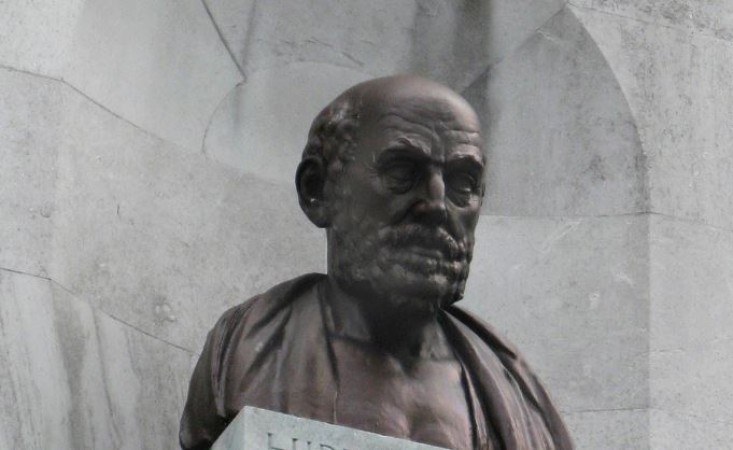
Hippocrates, often regarded as the father of medicine, is believed to have lived around 460-370 BC. He was an ancient Greek physician who laid the foundation for modern medical practices and ethics. His contributions to medicine have had a profound impact on the development of the healthcare field. This article delves into the life, achievements, and lasting legacy of Hippocrates, shedding light on how his principles and wisdom continue to influence medicine to this day.
1. The Early Life of Hippocrates
Hippocrates was born on the island of Kos in ancient Greece. He was born into a family of physicians, and his early exposure to the medical profession likely played a pivotal role in shaping his interest in medicine.
2. The Hippocratic Oath
One of the most enduring legacies of Hippocrates is the Hippocratic Oath. This ethical code has become a symbolic representation of medical professionalism and the duty of physicians to treat patients with utmost care and confidentiality. The oath emphasizes the principles of beneficence and non-maleficence and sets a standard for medical ethics that continues to guide modern healthcare practitioners.
3. Observational Medicine
Hippocrates is celebrated for his emphasis on observational medicine. Unlike the prevailing beliefs of his time that attributed illness to divine intervention, he sought to understand diseases through observation and natural causes. This approach laid the foundation for evidence-based medicine, encouraging physicians to base their diagnoses and treatments on empirical evidence.
4. Humoral Theory of Medicine
Hippocrates introduced the humoral theory of medicine, which posited that the body's health was determined by the balance of four bodily fluids: blood, phlegm, yellow bile, and black bile. An imbalance in these fluids was believed to cause illness, and treatment often involved restoring the balance. While the humoral theory is no longer considered scientifically accurate, it was a significant step in the history of medicine, influencing medical thought for centuries.
5. The Hippocratic Corpus
The Hippocratic Corpus is a collection of approximately 60 ancient medical texts attributed to Hippocrates and his students. These writings cover various medical topics and observations, including surgical techniques, diseases, and ethics. The Corpus is a valuable resource for understanding the medical practices of ancient Greece and provides insight into the development of medical knowledge over time.
6. Contributions to Surgery
Hippocrates made significant contributions to the field of surgery. He introduced several surgical tools and techniques, including the use of the speculum to examine the rectum and the reduction of dislocated joints. His innovative approach to surgery laid the groundwork for advancements in surgical practices.
7. Legacy and Influence
Hippocrates' influence on medicine extends far beyond his own time. His dedication to scientific inquiry, ethical principles, and patient care set a standard that continues to inspire physicians and healthcare professionals today. Many medical schools and institutions around the world incorporate elements of the Hippocratic Oath into their graduation ceremonies, symbolizing their commitment to upholding the values of this ancient healer.
8. Misconceptions and Controversies
While Hippocrates is revered as the father of medicine, some misconceptions and controversies surround his work. Due to the lack of historical records, it is challenging to differentiate between Hippocrates' contributions and those of his students. Additionally, some of the treatments and practices described in the Hippocratic Corpus are considered outdated and potentially harmful by modern medical standards.
9. How Hippocrates Changed the World of Medicine
Hippocrates' relentless pursuit of knowledge and his emphasis on observation and ethical conduct transformed medicine from a mystical practice into a systematic and evidence-based science. His ideas challenged the prevailing dogmas of his time, paving the way for future generations of physicians to question, innovate, and advance the field of medicine.
10. The Hippocratic Oath Today
Even in the modern era of medicine, the Hippocratic Oath continues to hold significance. While it has evolved over the centuries, the core principles of compassion, integrity, and patient-centered care remain relevant in contemporary healthcare settings.
Hippocrates, the father of medicine, was not merely an ancient healer but a visionary who revolutionized the way we approach medical practice. His commitment to ethical conduct, evidence-based medicine, and patient care laid the foundation for modern healthcare systems. Although the medical landscape has evolved significantly since ancient Greece, the principles championed by Hippocrates continue to inspire and guide medical professionals worldwide.
Govt Action Looms for Twitter after Viral Video of Manipur Women Paraded Naked
Manipur Unrest: CM Urges Thorough Probe into Viral Video's Authenticity
Sonia Gandhi Urges PM Modi for Manipur Discussion in Parliament